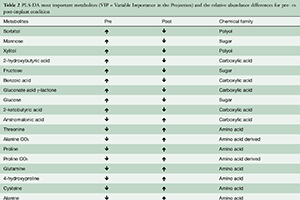Metabolomic profile of patients with left ventricular assist devices: a pilot study
Abstract
Background: Metabolomic profiling has important diagnostic and prognostic value in heart failure (HF). We investigated whether left ventricular assist device (LVAD) support has an impact on the metabolomic profile of chronic HF patients and if specific metabolic patterns are associated with the development of adverse events.
Methods: We applied untargeted metabolomics to detect and analyze molecules such as amino acids, sugars, fatty acids and other metabolites in plasma samples collected from thirty-three patients implanted with a continuous-flow LVAD. Data were analyzed at baseline, i.e., before implantation of the LVAD, and at long-term follow-up.
Results: Our results reveal significant changes in the metabolomic profile after LVAD implant compared to baseline. In detail, we observed a pre-implant reduction in amino acid metabolism (aminoacyl-tRNA biosynthesis) and increased galactose metabolism, which reversed over the course of support [median follow-up 187 days (63–334 days)]. These changes were associated with improved patient functional capacity driven by LVAD therapy, according to NYHA functional classification of HF (NYHA class I-II: pre-implant =0% of the patients; post-implant =97% of the patients; P<0.001). Moreover, patients who developed adverse thromboembolic events (n=4, 13%) showed a pre-operative metabolomic fingerprint mainly associated with alterations of fatty acid biosynthesis and mitochondrial beta-oxidation of short-chain saturated fatty acids.
Conclusions: Our data provide preliminary evidence that LVAD therapy is associated with changes in the metabolomic profile of HF and suggest the potential use of metabolomics as a new tool to stratify LVAD patients in regard to the risk of adverse events.
Cover






